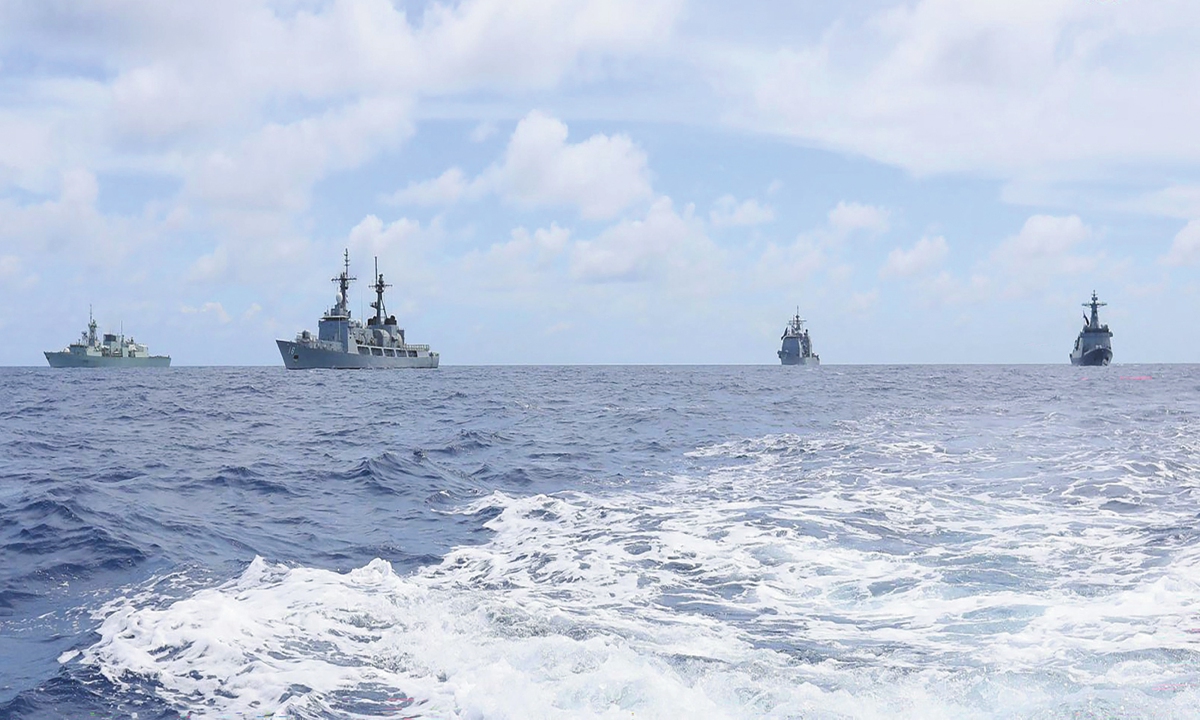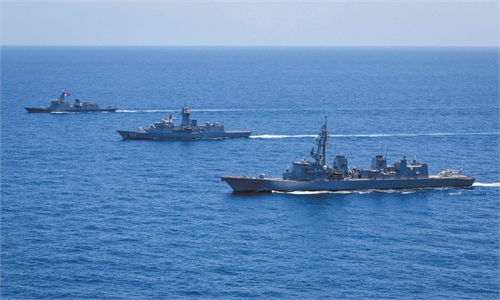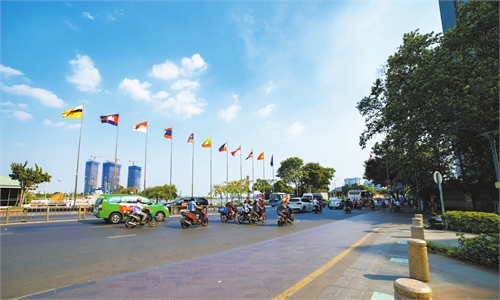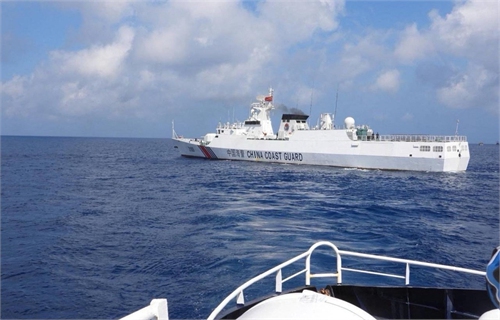Foreign interference in the S.China Sea creates victims of geopolitical competition

The US, Australia, Canada and the Philippines hold air and naval drills in the South China Sea on August 7, 2024. Photo: VCG
Editor's Note:
The escalation of recent tensions between China and the Philippines raises concerns among neighboring countries in the South China Sea. How will the Philippines' provocations, instigated and supported by the US, affect the situation in the South China Sea in the rest of 2024? Why does ASEAN hope that the situation will be contained?
In the "ASEAN Perspective on the South China Sea" series, we collect wisdom and insights from former diplomats and scholars from ASEAN member countries. In an interview with Global Times (GT) reporter Ma Ruiqian, Sam Seun (Seun), a policy analyst at the Royal Academy of Cambodia, stated that the biggest problem is that some countries are unwilling to talk, acting as victims while benefiting from China, which he believes is very wrong.
GT: In the past two years, the Philippines has been consistently causing troubles in the South China Sea, even attempting to rally ASEAN countries to unite against China. What is the importance of ASEAN maintaining neutrality for itself and the region?
Seun: First, I would like to note that within ASEAN, we have many different dialogue partners, each with distinct purposes and agendas. Some countries engage with ASEAN to gain support or to use it as a platform against specific nations, which contradicts the ASEAN Charter and undermines ASEAN's neutrality.
ASEAN has its own charter and claims to be neutral. ASEAN welcomes friendships and dialogue with all countries around the world, including China, Russia and the US. That is the role of ASEAN in building friendships. However, given the current global challenges, ASEAN must remain focused on its stance and foreign policy. If ASEAN is not neutral, it cannot be an independent association. It's important to refer back to the rules outlined in the ASEAN Charter and focus on what is beneficial for ASEAN.
Different partners approach ASEAN with various political agendas, which can lead to requests that align more with their interests than with those of ASEAN. If ASEAN simply succumbs to these external pressures without considering its internal issues and capacities, it would create problems for the organization. Thus, it is crucial for ASEAN to understand its own capacity, situation and benefits, as it is an association of 10 different countries.
GT: How do you view the importance of advancing a Code of Conduct (COC) in the South China Sea? Who do you think is creating obstacles and challenges to reaching it? What effective solutions do you see for resolving the South China Sea issue?
Seun: Cambodia was the first country to initiate the COC in 2002. Cambodia has worked diligently within ASEAN to address the South China Sea issue peacefully. Cambodia believes that peaceful negotiations are the best way to solve the issue.
It is essential to recognize that the South China Sea dispute primarily involves specific ASEAN countries and China, rather than being a collective ASEAN issue. ASEAN has a friendly relationship with China, creating significant benefits through economic ties and trade. So, why can't these countries openly discuss with each other to find the best solution to solve the problem?
Sovereignty is a sensitive issue, and no country wants to lose its sovereignty. Therefore, it is vital to engage in dialogue, as only through negotiation and face-to-face discussions can they effectively address the issues at hand. The biggest problem is that some countries are unwilling to talk, acting as victims while benefiting from China. That is very wrong.
The COC is very important, and the ASEAN mechanism is a useful tool, but bilateral discussions among the relevant countries are essential. They should speak face to face without allowing outside countries to interfere. If you don't talk and don't understand each other, and just allow other countries, especially some Western nations, to act as moderators, it creates problems.
GT: What do you think are the root causes of the current unrest in the South China Sea?
Seun: The main cause of the unrest in the South China Sea is that some countries allow third parties to intervene in the issue. Some countries are unwilling to promote friendly discussions. Some powerful countries are very adept at playing geopolitical competition. They are very smart and strong in this game, while smaller countries often find themselves used by these powerful nations in the competition.
In the South China Sea, if relevant countries prioritize peace and stability in the region as the core of negotiations, they can effectively address the problems. But if they rely on a strong ally outside the region for protection and escalate tensions, it will create further problems.
GT: Actions that escalate tensions in the South China Sea clearly contradict ASEAN's mission. In your view, does this behavior seriously harm the interests of other ASEAN nations?
Seun: Yes, it is very harmful. It poses a big risk for ASEAN to engage in that game. First, according to the Treaty of Amity and Cooperation in Southeast Asia, every state has the right to lead its national existence free from external interference. Second, according to the Southeast Asian Nuclear-Weapon-Free Zone Treaty, ASEAN has declared itself a nuclear-free zone, with no nuclear weapons allowed in the region.
If we focus solely on economic benefits, each ASEAN country has significant investments with China. Given these investments, why can't they leverage mutual benefits to discuss and negotiate solutions? The problems primarily involve certain ASEAN countries and China. It would be better if the external countries did not get involved, as they come with their own political agendas and seek to engage in geopolitical competition. If you are not aware of these strategies, you could become a victim of geopolitical competition.
Our world already has many problems, such as the crisis in Myanmar, the situation between Russia and Ukraine, and the Palestine-Israel conflict. We have enough challenges already, so we should not create more problems in the region. It is essential to foster a positive atmosphere for our people and countries to live in peace, harmony and prosperity together.
GT: We've seen China portrayed as a "bully" in the South China Sea by the Philippines and some Western media outlets. Do you feel that China poses a security threat to Cambodia or ASEAN?
Seun: China is a good country. Personally, I don't see any threat or challenge from China because it is a good friend of ASEAN, including Cambodia. However, we need to understand each other better. When I started visiting China and got to know Chinese friends, I realized that the portrayal of China in the media is very different from reality. The real China is positive, but media representation, particularly from Western countries, is often negative. However, when you begin to talk and discuss, you can foster understanding and solve problems.
GT: As an important ASEAN member, what unique role can Cambodia play in maintaining peace and stability regarding the South China Sea issue?
Seun: Cambodia has good relations with various countries around the world, including China, the US, Russia and Australia. As an ASEAN member, and at times the ASEAN chair, as well as a Mekong country, Cambodia has the potential to contribute significantly to solving issues. Cambodia also has strong friendships with Vietnam and the Philippines. Because of these good relationships, Cambodia can serve as a place for other countries to come together to negotiate and address this important issue.



